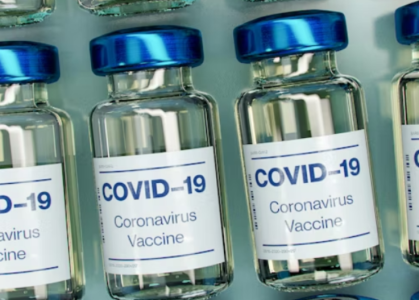A new COVID variant is here—what to know about symptoms and vaccine changes
- Replies 1
The US has detected cases of a fast-spreading COVID variant known as NB.1.8.1, now linked to a recent surge in China.
According to the CDC, the number of sequences is still too low to appear in official variant tracking dashboards.
However, experts are urging caution as the variant displays signs of being more transmissible.
Here's what you need to know.
The symptoms of NB.1.8.1 remain familiar—cough, sore throat, fever, and fatigue.
NB.1.8.1 is associated with symptoms that are “broadly similar to those seen in earlier strains of the virus,” said Subhash Verma, professor of microbiology at the University of Nevada.
These signs may not indicate a more severe illness, but they do suggest continued risk of infection.
Experts are watching hospitalization trends overseas for signs of future surges.

“Data indicates that NB.1.8.1 does not lead to more severe illness compared to previous variants, although it appears to have a growth advantage, suggesting it may spread more easily,” Verma added.
Dr. Amy Edwards agreed, saying there is some evidence in the lab that this variant binds more tightly to human cells.
While that makes it more transmissible, the illness itself doesn’t seem worse. “doesn't seem to be more severe.,” she concluded.
Despite the variant’s spread, most Americans won’t have access to an updated booster this fall.
The FDA will approve new COVID shots only for seniors and people with underlying conditions like pregnancy or diabetes.
“The new policy may also create confusion and reduce vaccination rates if people are uncertain about their eligibility or worried about insurance coverage,” said Verma.
This decision comes as the FDA requires more trials before wider public rollout.
“It’s not clear what variants are going to be in this year’s vaccine,” Edwards noted, highlighting public concern.
Many experts are also questioning the policy shift under HHS Secretary Robert F. Kennedy Jr. “In fact, what is happening is people are going to lose access to vaccines,” said Dr. Céline Gounder.
Critics say this move could leave millions vulnerable if another wave strikes.
Even if boosters are out of reach, basic prevention still matters.
“Good cough and sneezing hygiene, good hand washing, staying home if you're not feeling well to keep other people from catching what you've got,” said Edwards.
Masks remain a reliable tool when someone is mildly ill and still out in public. “That's not just for COVID. That's any respiratory virus.”
Read next:

What’s your take—do you think the U.S. should limit vaccine access, or make it more available across the board? Drop your thoughts in the comments below.
According to the CDC, the number of sequences is still too low to appear in official variant tracking dashboards.
However, experts are urging caution as the variant displays signs of being more transmissible.
Here's what you need to know.
The symptoms of NB.1.8.1 remain familiar—cough, sore throat, fever, and fatigue.
NB.1.8.1 is associated with symptoms that are “broadly similar to those seen in earlier strains of the virus,” said Subhash Verma, professor of microbiology at the University of Nevada.
These signs may not indicate a more severe illness, but they do suggest continued risk of infection.
Experts are watching hospitalization trends overseas for signs of future surges.

A new COVID variant is here—what to know about symptoms and vaccine changes. Image source: Daniel Schludi / Unsplash
“Data indicates that NB.1.8.1 does not lead to more severe illness compared to previous variants, although it appears to have a growth advantage, suggesting it may spread more easily,” Verma added.
Dr. Amy Edwards agreed, saying there is some evidence in the lab that this variant binds more tightly to human cells.
While that makes it more transmissible, the illness itself doesn’t seem worse. “doesn't seem to be more severe.,” she concluded.
Despite the variant’s spread, most Americans won’t have access to an updated booster this fall.
The FDA will approve new COVID shots only for seniors and people with underlying conditions like pregnancy or diabetes.
“The new policy may also create confusion and reduce vaccination rates if people are uncertain about their eligibility or worried about insurance coverage,” said Verma.
This decision comes as the FDA requires more trials before wider public rollout.
“It’s not clear what variants are going to be in this year’s vaccine,” Edwards noted, highlighting public concern.
Many experts are also questioning the policy shift under HHS Secretary Robert F. Kennedy Jr. “In fact, what is happening is people are going to lose access to vaccines,” said Dr. Céline Gounder.
Critics say this move could leave millions vulnerable if another wave strikes.
Even if boosters are out of reach, basic prevention still matters.
“Good cough and sneezing hygiene, good hand washing, staying home if you're not feeling well to keep other people from catching what you've got,” said Edwards.
Masks remain a reliable tool when someone is mildly ill and still out in public. “That's not just for COVID. That's any respiratory virus.”
Read next:
- Changes to a major health plan may affect how some get their COVID shots
- New twist: China just made a surprising claim about where COVID-19 really came from!
Key Takeaways
- NB.1.8.1 causes familiar COVID symptoms like sore throat, fatigue, and cough.
- “Data indicates that NB.1.8.1 does not lead to more severe illness compared to previous variants, although it appears to have a growth advantage, suggesting it may spread more easily.”
- New boosters will only be available to seniors and high-risk individuals.
- “Good cough and sneezing hygiene, good hand washing, staying home if you're not feeling well to keep other people from catching what you've got.”





